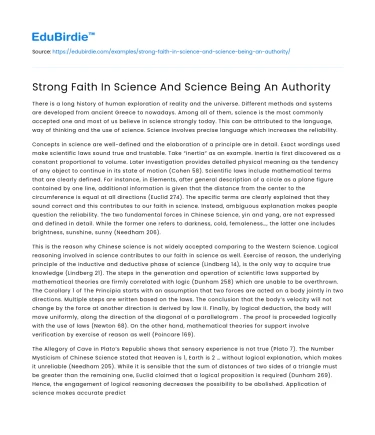There is a long history of human exploration of reality and the universe. Different methods and systems are developed from ancient Greece to nowadays. Among all of them, science is the most commonly accepted one and most of us believe in science strongly today. This can be attributed to the language, way of thinking and the use of science. Science involves precise language which increases the reliability.
Concepts in science are well-defined and the elaboration of a principle are in detail. Exact wordings used make scientific laws sound true and trustable. Take “inertia” as an example. Inertia is first discovered as a constant proportional to volume. Later investigation provides detailed physical meaning as the tendency of any object to continue in its state of motion (Cohen 58). Scientific laws include mathematical terms that are clearly defined. For instance, in Elements, after general description of a circle as a plane figure contained by one line, additional information is given that the distance from the center to the circumference is equal at all directions (Euclid 274). The specific terms are clearly explained that they sound correct and this contributes to our faith in science. Instead, ambiguous explanation makes people question the reliability. The two fundamental forces in Chinese Science, yin and yang, are not expressed and defined in detail. While the former one refers to darkness, cold, femaleness…, the latter one includes brightness, sunshine, sunny (Needham 206).
Save your time!
We can take care of your essay
- Proper editing and formatting
- Free revision, title page, and bibliography
- Flexible prices and money-back guarantee
This is the reason why Chinese science is not widely accepted comparing to the Western Science. Logical reasoning involved in science contributes to our faith in science as well. Exercise of reason, the underlying principle of the inductive and deductive phase of science (Lindberg 14), is the only way to acquire true knowledge (Lindberg 21). The steps in the generation and operation of scientific laws supported by mathematical theories are firmly correlated with logic (Dunham 258) which are unable to be overthrown. The Corollary 1 of The Principia starts with an assumption that two forces are acted on a body jointly in two directions. Multiple steps are written based on the laws. The conclusion that the body’s velocity will not change by the force at another direction is derived by law II. Finally, by logical deduction, the body will move uniformly, along the direction of the diagonal of a parallelogram . The proof is proceeded logically with the use of laws (Newton 68). On the other hand, mathematical theories for support involve verification by exercise of reason as well (Poincare 169).
The Allegory of Cave in Plato’s Republic shows that sensory experience is not true (Plato 7). The Number Mysticism of Chinese Science stated that Heaven is 1, Earth is 2 … without logical explanation, which makes it unreliable (Needham 205). While it is sensible that the sum of distances of two sides of a triangle must be greater than the remaining one, Euclid claimed that a logical proposition is required (Dunham 269). Hence, the engagement of logical reasoning decreases the possibility to be abolished. Application of science makes accurate prediction and brings practical advantages in different aspects. Scientific principles could be applied to forecast the future events (Cohen 61). Edmond Halley applied Newtonian Physics and predict that the comet would reappear in 1758. The comet appeared right on schedule was amazing and extraordinary in the 18th century, which is the starting point of the faith in science (Cohen 62). Correct prediction allows scientific theories to be applied in many perspectives and contributes to great achievement (Poincare 164). For example, artificial satellites and spacecraft can be guided by Newtonian physics (Cohen 49). Since science can precisely foretell future events in different circumstances, we believe that it is a correct way of thinking. Meanwhile, science has limitation that it is impossible for human to discover the entire nature (Poincare 159). Only simple and recurring facts are selected to derive laws (Poincare 160). This reveals that humans are only able to do the damnedest and no holds barred (Lindberg 21).
The contrast between human and the nature is illustrated by science. This makes sense that nothing is perfect including science and that is the reason why science is widely accepted. However, it seems irrational that we believe in whatever scientists told us. We believe in heliocentric model instead of geometric model on the ground simply because it is stated by scientists. Although this appears to be irrational, there is a reasonable explanation. As concise language is involved in the logical operation, and prediction is made by further application of principles, theories and conclusion drawn in science are trustable. Being widely accepted, science becomes an authority. Findings in scientific investigation are always true without doubt, therefore we simply believe in what scientists discovered undoubtedly. In conclusion, it is rational that we believe in whatever scientists told us since they are the authority.






 Stuck on your essay?
Stuck on your essay?

